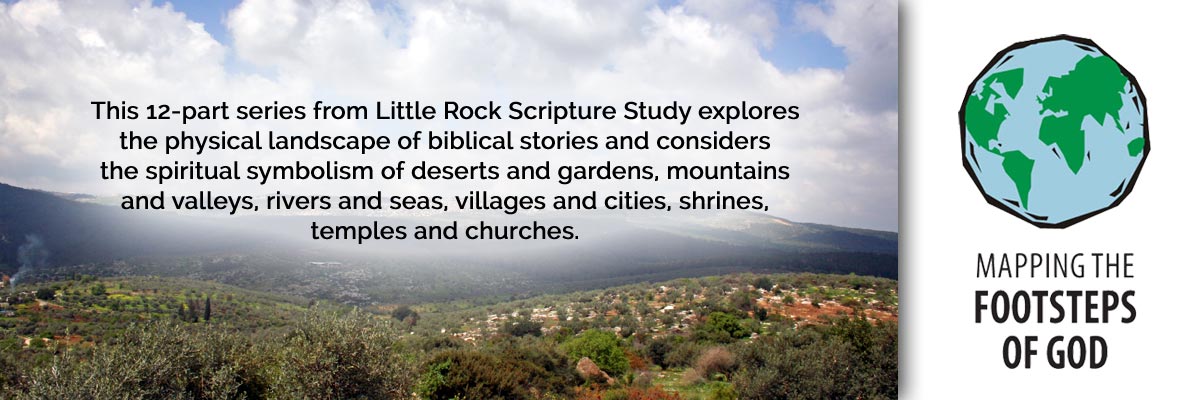Official Website of the
Catholic Diocese of Little Rock
God's plan is the original 'urban renewal'
Published: September 13, 2014
This is the ninth column in a 12-part series
By Cackie Upchurch
Director of Little Rock Scripture Study
A number of cities play a key role in salvation history. Simply put, a city is a town with a significant population, important for being a center of commerce and culture.
 One of the first cities mentioned in the Bible is also one of the world's earliest continuous settlements, dating perhaps to 9000 BC. Jericho is identified as the home of Rahab, the prostitute who provided protection for Joshua's advance soldiers (Joshua 2), and the place where his army brought down the walls (Joshua 6) so that the Israelites could advance into the Promised Land. In the Gospel accounts, Jericho is the locale for the stories of Zaccheus the tax collector (Luke 19:1-9) and the healing of blind Bartimaeus (Mark 10:46-52).
One of the first cities mentioned in the Bible is also one of the world's earliest continuous settlements, dating perhaps to 9000 BC. Jericho is identified as the home of Rahab, the prostitute who provided protection for Joshua's advance soldiers (Joshua 2), and the place where his army brought down the walls (Joshua 6) so that the Israelites could advance into the Promised Land. In the Gospel accounts, Jericho is the locale for the stories of Zaccheus the tax collector (Luke 19:1-9) and the healing of blind Bartimaeus (Mark 10:46-52).
If Jericho is an entry point for God's people who came to Canaan in the 13th century BC, Babylon is the name of the city and empire associated with their exile from that same land in the sixth century BC. As early as Genesis 11 there is notice of its presence in the reference to the tower of Babel (Hebrew for Babylon). In Isaiah 13, the city is described in magnificent terms, though its splendor is also seen as a source of its idolatry (Isaiah 47:9-13).
Babylon's defeat of Judah/Israel is seen as evidence of the sinfulness of God's people during the time of Jeremiah, making the Babylonian Empire an agent of God's judgment against his people (Jeremiah 25:9; 27:5-8). The very mention of Babylon in the writings of the prophets usually made an immediate connection to a very painful period of Israel's history. And in the final book of the Bible, 1st century Christians used the name Babylon to designate Rome, allowing the persecuted Church to look toward a future when God's power would triumph over the evils of the Roman Empire (see Revelation 16:19; 17:1–18:24).
Just as Babylon came to represent more than just a physical location, so Jerusalem took on powerful symbolic significance in both the Old and New Testaments. It was a small Canaanite city-state on the southern slope of Mount Moriah when King David conquered it in the early 10th century BC and established it as the capital city of Israel (2 Sam 5:6-13). Mount Moriah was associated with the earlier sacrifice of Isaac (Genesis 22), and became the location of the Temple built by David's son, King Solomon (2 Chronicles 3:1).
The Jerusalem Temple and the city itself served as sign and symbol of God's presence within Israel, God's election of this people as his very own and God's desire to protect them. And so the destruction by Babylon in 587 BC was a devastating blow to their national and religious identity. The return of the exiles 50 to 70 years later to the city of Jerusalem saw the eventual rebuilding of the Temple, though never in all the grandeur of its first rendition.
Jerusalem remained the place where Jewish pilgrims traveled to celebrate the high holy days; it is the place where Jesus was presented for purification as an infant and then as a boy was found teaching the elders in the Temple surroundings; it is the place where Jesus encountered the fiercest resistance to his message and where he met his eventual arrest and death.
Jerusalem is the place where an empty tomb became a sign of new life, where the risen Jesus appeared to his followers and commissioned them to go out to all the world and where they received the Spirit to begin this mission to other cities such as Antioch, Corinth, Philippi and Rome.
It is little wonder that when an exiled disciple on the island of Patmos in the late 1st century received a divine vision, Jerusalem figured largely in the picture. God promises to the faithful a new Jerusalem (Revelation 21) where God's glory provides its light and its gates are open to all.
The stories, events and people we find in Scripture become real for us partly because they are situated in time and place. Perhaps we have a better chance of hearing the ancient voices speak to us because they emerge from barren places, rural settings and urban centers, locations that help to ground our experiences as well. It is in these places, among them our own cities, that we too may encounter the divine.
Study Questions
- Many people speak of spiritual experiences in nature but not so often in cities. Have you ever had a moment of spiritual clarity or insight that happened in the midst of city life?
- Can you think of cities (or even empires) that have become synonymous with spiritual realities such as evil and virtue in the way we speak about them?
- Select one of the four Gospels and skim through it. What kinds of things in that account are connected with the city of Jerusalem?
- What unique opportunities for service in God's name might we have in the environment of a city?
This article was originally published in Arkansas Catholic Sept. 13, 2014. Copyright Diocese of Little Rock. All rights reserved. This article may be copied or redistributed with acknowledgement and permission of the publisher.




